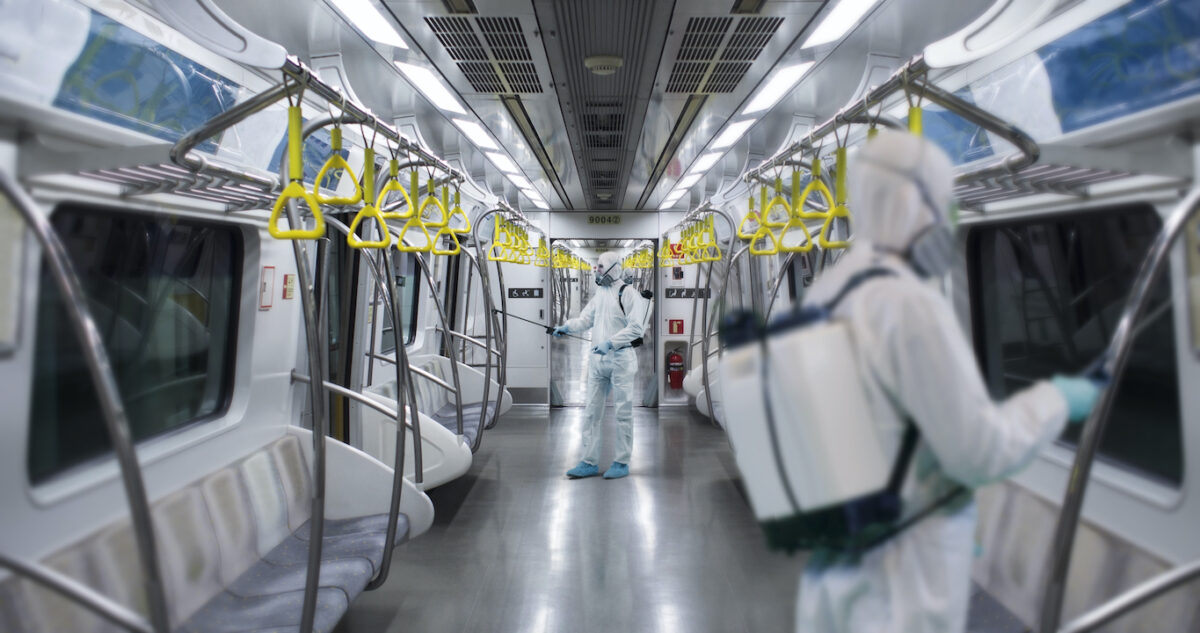


A new study indicates that how we sanitize for germs can determine how at risk we are from catching a cold from a virus or bacteria.
Decontaminating subway trains with a probiotic-based cleaning solution was found far more effective than chlorine-based cleaners at killing pathogens, including SARS-CoV-2, the virus responsible for causing COVID-19.
This was the conclusion after a 12-week study that began in September 2021 comparing two cleaning methods in Italian trains, according to results published on March 30 in Microbiome. This seems to validate pre-pandemic concerns that over-sanitation could be driving microbial adaptation, which is an issue of concern because it can lead to more virulent pathogens while lowering human resistance. The use of harsh chemicals is also toxic to humans and detrimental to the environment, the study pointed out.
In a way, the results of this study mirror human gut microbiome research that shows antibiotics and other perturbations wipe out good bacteria, making the host vulnerable to infection and lowering immunity. In this case, the trains are the microbiome—an environment that houses various microorganisms like bacteria, viruses, and fungi. Samples were collected on the floor, seats, surfaces, and doors of the trains, which were also analyzed for bioburdens by categorizing passenger flow and the total number of travelers.
In the study, probiotic cleaning using mild eco-friendly detergent contained spores of selected probiotics from the Bacillus genus, which has been shown to colonize on treated surfaces. The bacteria work by overcoming pathogens through competitive exclusion, a principle that only one species among those fighting for the same resources will survive.
“This speaks to a bigger concept that if you can strengthen the beneficial microbes … then they can take care of the pathogens without antibiotics or treatments,” Dr. Akil Palanisamy, a Harvard-trained physician who practices integrative medicine, told The Epoch Times. Palanisamy advocates for creating a terrain that is inhospitable for pathogens, so that antibiotic and antimicrobial agents become unnecessary or rare. The same philosophy applies to trains and humans.
“The pendulum has swung too far in terms of antibiotic cleaners,” he said.
While the pandemic motivated the study, the actual levels of SARS-CoV-2 detected were relatively low on both trains—under 10 percent. There were over 2.5 times more positive SARS-CoV-2 samples on the bleach-treated train compared to the one cleaned with Bacillus, which also had smaller viral loads in its samples.
“This, in light of the reported bacterial associations with SARS-CoV-2 presence both in humans and in the built environment, suggest that bacteria–virus synergy may play a role in the COVID-19 pandemic,” the study concludes. “The results show that innovative, eco-sustainable, low-cost sanitation based on probiotic Bacillus could effectively replace the widespread use of chemicals, forgoing the risk of further exacerbating (antimicrobial resistance) and pollution.”
The data collected during the study showed that pathogens decreased by 58 percent within two weeks of the first application in the train treated with probiotics, which became 100 percent free of all pathogens by the end of the trial. The train receiving normal cleaning did not have a significantly altered microbial makeup during the 12 weeks, in spite of the increased application of chlorine disinfectants in the first two weeks of the study. It was cleaned four times daily, compared to the train treated with the probiotic cleaner applied once daily.
Using the Bacillus strain also proved beneficial in that it did not alter the environmental microbiome of the train outside of its impact on the potential pathogenic microbes.
Because of the mandatory use of chemicals during the pandemic, the probiotic-based cleaner was only used to replace chlorine disinfection, and ethanol and ammonium disinfectants were maintained throughout the study. The probiotic was applied 30 minutes after the other disinfectants.
The problem with chemical-based disinfectants is they are not as effective, the benefit is relatively short-lived, they’re damaging to the environment, and they can potentially enhance antimicrobial resistance, the study said.
Since the majority of the worldwide population now lives in urban areas, mass transportation environments are of particular interest to researchers studying the spread and transfer of microbes. The diverse, high-traffic environment in subways can lead to rapid pathogen spread, as well as the exchange of microbes among billions of people, according to the study.
Collecting samples in subways is also an effective way to monitor antimicrobial resistance, the study claims. The authors reference a 2021 study in Cell that collected 4,728 samples from the mass transit systems of 60 cities around the world. Urban stress has been determined to impact microbial composition. Among the samples, researchers found antimicrobial genes were widespread globally but not particularly abundant.
Another subway study in Frontiers in Public Health in 2021 examined the role subways played in the spread of COVID-19 in New York City. It argues in favor of a pass-based system for riders that would improve contact tracing in future outbreaks.
The authors wrote that being able to individually track riders is necessary because some studies found transport systems were second behind family transmission in spreading COVID-19. They also argued that raw usage data available from turnstiles, along with general smartphone tracking data, were insufficient to perform contact tracing and prevent outbreaks.
On the other hand, the study in Microbiome pointed out how studying the microbial makeup of transportation systems, rather than people, could be beneficial for monitoring and controlling outbreaks.
“Overall, the results also confirm that characterizing the microbial profiles of the environments populated by humans is increasingly important for the biosurveillance of antimicrobial resistance and pathogens, which may be used as an early indicator of outbreaks and, in parallel, would aid in the more rational design of public transport aiming to avoid the development of microbial reservoirs and thus preserve human health,” the study concluded.
Furthermore, it argued that using Bacillus-based cleaning methods is sustainable and economical, as well as capable of completely replacing the widespread use of chemicals.
